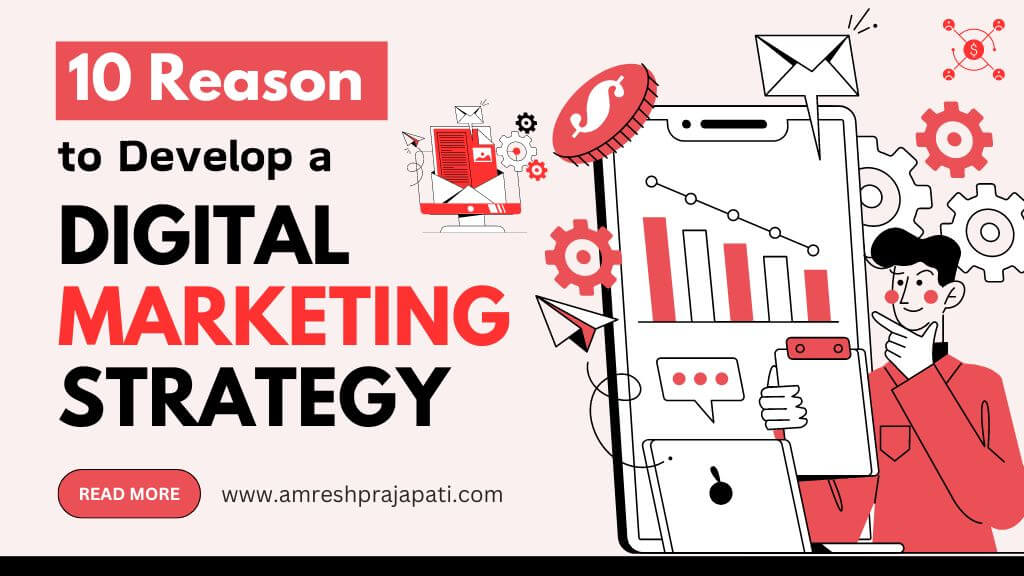Implementing a digital marketing strategy may seem overwhelming, but with the right approach, it can be both manageable and highly rewarding. This guide will walk you through the process of executing a digital marketing strategy successfully, using a blend of advanced techniques, thorough planning, and practical examples. By the end of this article, you’ll have a clear roadmap for developing and executing a winning digital marketing strategy for your business.
A Beginner’s Guide to Digital Marketing Strategies
Before diving into the implementation, it’s essential to understand what a digital marketing strategy involves. A digital marketing strategy is a comprehensive plan that outlines how your business will achieve its marketing goals through online channels such as search engines, social media, email, and your website. It includes leveraging various tactics to effectively reach and engage your target audience.
Steps to Craft a Digital Marketing Strategy
1. Define Your Goals and Objectives
Begin by clearly identifying what you aim to achieve with your digital marketing efforts. Your goals should follow the SMART criteria—Specific, Measurable, Attainable, Relevant, and Time-bound.
2. Know Your Audience
Conduct in-depth research to understand your target audience. Utilize tools like customer personas and journey mapping to gain insights into their behaviors, needs, and preferences.
3. Analyze Your Competitors
Examine your competitors’ digital marketing strategies. Identify what’s working well for them and pinpoint opportunities where you can differentiate your approach.
4. Conduct a SWOT Analysis
Perform a SWOT analysis to assess your strengths, weaknesses, opportunities, and threats. This helps you understand your position in the market.
5. Select Your Digital Marketing Channels
Choose the most effective digital channels for engaging your audience. These might include social media, email marketing, content marketing, and SEO, among others.
6. Develop a Content Marketing Plan
Create a detailed content marketing plan that outlines the type of content you will produce, the frequency of publication, and the channels you’ll use for distribution.
7. Implement Marketing Automation
Incorporate marketing automation tools to streamline your campaigns and enhance efficiency. Automation can assist with tasks like email marketing, social media management, and lead nurturing.
8. Measure and Optimize
Regularly monitor the performance of your digital marketing strategy using key performance indicators (KPIs). Use this data to make informed decisions and optimize your strategy for better results.
Advanced Digital Marketing Strategies
To remain competitive in the digital landscape, it’s crucial to integrate advanced techniques into your strategy. Here are some advanced digital marketing strategies to consider:
SEO Strategy
A strong SEO strategy is vital for boosting your online visibility. Focus on both on-page and off-page SEO practices. Optimize your website’s content, meta tags, and images for relevant keywords, and build high-quality backlinks to improve your search engine ranking.
Content Marketing Plan
A well-crafted content marketing plan can drive traffic, build brand authority, and engage your audience. Create valuable, informative, and engaging content that addresses your audience’s pain points and interests, utilizing formats like blog posts, videos, infographics, and e-books.
Email Marketing Strategies
Email marketing remains a powerful tool for nurturing leads and converting them into customers. Segment your email lists based on customer behavior and preferences, personalize your campaigns, and use automation to send targeted emails, such as welcome sequences and abandoned cart reminders.
Marketing Automation
Marketing automation can greatly enhance your strategy by automating repetitive tasks and improving overall efficiency. Utilize tools to schedule social media posts, send personalized emails, and track customer interactions, allowing you to focus on more strategic initiatives.
Digital Marketing Tools
Leverage digital marketing tools to streamline your efforts and gain valuable insights. Tools like Google Analytics, SEMrush, Ahrefs, and HubSpot can assist in tracking performance, conducting keyword research, analyzing competitors, and managing campaigns.
Marketing Analytics
Analytics are critical for measuring the success of your digital marketing strategy. Track key metrics such as website traffic, conversion rates, click-through rates, and ROI. Use this data to refine your campaigns and achieve better outcomes.
Conversion Rate Optimization (CRO)
CRO involves optimizing your website and landing pages to increase the percentage of visitors who take desired actions, such as making a purchase. Conduct A/B testing, analyze user behavior, and make data-driven changes to boost conversion rates.
Implementing a Digital Marketing Strategy for B2B Companies
B2B companies require a tailored approach to digital marketing. Here are some specific tactics for executing a successful B2B strategy:
Focus on LinkedIn
LinkedIn is an essential platform for B2B marketing. Use it to connect with industry professionals, share valuable content, and generate leads. Engage with your target audience by participating in LinkedIn groups and discussions.
Develop Case Studies
Case studies are highly effective in B2B marketing. Showcase your successful projects and the results achieved for clients, demonstrating your expertise and building trust.
Invest in Webinars
Webinars are an excellent way to educate your audience and generate leads. Host webinars on industry-relevant topics, offering valuable insights and solutions to your audience’s challenges.
Use Account-Based Marketing (ABM)
Account-Based Marketing involves targeting specific high-value accounts with personalized campaigns. Identify key accounts, create tailored content, and engage them with personalized outreach.
Tips for a Successful Digital Marketing Strategy
To ensure your digital marketing strategy’s success, follow these key tips:
- Set Clear Objectives: Clearly define your objectives, whether it’s increasing brand awareness, generating leads, or boosting sales.
- Align with Business Goals: Ensure your strategy aligns with your overall business goals, contributing to your company’s growth.
- Adopt a Data-Driven Approach: Make decisions based on data and insights, not assumptions. Use analytics tools to track performance and refine your strategy.
- Continuously Optimize: Digital marketing is an ongoing process. Regularly review and update your strategy based on performance data, staying ahead of industry trends.
Digital Marketing Strategy Checklist
To stay organized, use this checklist:
- Define goals and objectives
- Understand your target audience
- Analyze competitors
- Conduct a SWOT analysis
- Select digital marketing channels
- Develop a content marketing plan
- Implement marketing automation
- Track performance with analytics
- Optimize based on data
Digital Marketing Strategy Examples
Looking at successful digital marketing strategies can offer valuable insights:
- Nike: Nike’s strategy includes social media marketing, influencer partnerships, and engaging content that resonates with their audience.
- HubSpot: HubSpot uses inbound marketing and provides valuable content through blogs, e-books, and webinars to attract and engage customers.
- Airbnb: Airbnb combines content marketing, social media, and email marketing to showcase unique accommodations and encourage user-generated content.
Conclusion
Executing a digital marketing strategy effectively requires careful planning, advanced techniques, and ongoing optimization. By following the steps in this guide, you can create a digital marketing strategy that drives significant results and helps your business achieve its goals. Stay data-driven, customer-focused, and always be ready to adapt to new trends and opportunities in the digital marketing landscape.




